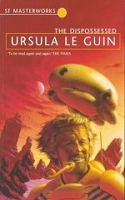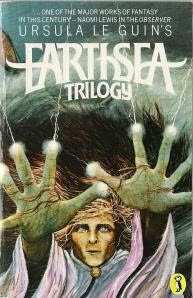

A science fiction novel which tells the story of Winter, an Earth-like planet where the weather conditions are semi-arctic and the inhabitants are all of the same sex, which is invited to join a coalition of planets. To be more precise the inhabitants are of the same sex five sixths of their lives when they are able to sire or give birth to offspring. This novel left me somewhat out in the cold. Although Le Guin's a master storyteller and her narrative flows effortlessly I found her recounting of Estraven and Genly Ai's harrowing trek across the ice caps grating. It is meant to sum up the unconsummated respect and love reciprocated and shared with philosophical musings on the male versus female, light versus dark dynamic. I found it transparent and schmaltzy. Perhaps I am in the minority on this point but I couldn't shake the thrusted obviousness of it all. It smacked of Le Guin trying to pluck heart strings without hitting the right chord. However, it is my only gripe of this beautiful novel, but, a major gripe.


Two planets orbiting each other named Urras and Anarres are populated by humans who have a shared history but whose inhabitants co existence is strained, uneasy yet never violent. The beings who eke out a very hard living on Anarres are the descendants of a group of rebels who fought for socio-economic change on the planet Urras some seven generations past but were unsuccessful. They were given and took the opportunity to distance themselves from the elite "profiteers" classes and misery of Urras. They choose to live in a evenly governed state of self imposed exile. Anarres is an arid world, barely lovable and their are many times of drought and famine. The Odonians as they now call themselves still choose to live their as their society is one free of partisan politics, nations, governments and private property. The planet Urras is however its antithesis both in moral values and rules of law. Urras is a paradise, a paradise for those able to enjoy and reap its benefits but it reflects on the modern world of today that their is still too much poverty and needles suffering. A gifted and brilliant man named Shevak has in his mind a revolutionary theory; a mathematical formula, which - if correct, and put into practice, will revolutionize space time communications. He both fears and acknowledges its far reaching potential. The tale is told from chapter to chapter from Shevak's view about his time and upbringing on Anarres, where in this free society names are given to every individual via computer and work is assigned not to someone's ability but on an arbitrary basis while on Urras he is treated like a celebrity and handled with utmost care and due diligence. The thing is that this novel moves along with the grace and flow of tectonic plate movements. What is it meant to portray to the reader? I honestly don't know. I understand that almost any society no matter how well meaning its tenants for making a society; can never be problem free. Undoubtedly it will many hidden pitfalls but Le Guin's metaphor for suffering and misery experienced on both planets is overly simplistic. Shevak's law free planet's pioneering citizens had intentionally set up a system which was meant to protect and nurture its inchoate society with a group mentality which split families and somehow was meant to tighten bonds within communities. I found it so quixotic and just downright unbelievable that I felt at times she must be ready to unleash a scathing polemic against the well meaning sophists of Anarres. A society as insular as Anarres deserves to be hypothesized but I pray it never comes to fruition. Urras is a malfunctioning Utopia which shows Shevak that although mankind has a propensity for inflicting pain on his fellow man he is capable of so many beautiful crafts and works of art which are so painfully lacking in abundance on his home world. I knew what this novel was about before I bought it and I knew what not to expect but this tale of Shevak's awakenings lacked a certain believability because as long as we humans are around their will be both scientific advancement and heinous acts of barbarism committed. We cannot escape what we fundamentally are, flawed but capable of so much. I am cynical, but fact can never be discounted, for if it was we may as well as a species walk back into the sea and allow a different lifeform to take over the planet. Maybe they will do a better job.


A Wizard Of Earthsea
This adventure details how a poor, uneducated, and motherless boy rises from his lowly position in life to become a famed wizard. Within the vast realm of islands surrounded by straits, seas, to which our novel's central character, Duny (later named Sparrowhawk) , magic and chaos is in abundance. During his mid teens a marauding band of sailing pillagers attacks his home island of Gont, and it is this incident which propels the young Gontishman into saving the village of his people by means of magical extemporization and creativity. His heroic deed does not go unnoticed.
This sets the scene for the emergence of a powerful mage named Ogion to offer Sparrowhawk the chance to study higher magic. From this point on the gradual unfolding of what magic is, and how its power is eternally linked with an equilibrium that must be acknowledged and respected before it is utilised. The magic represented and detailed in this novel is a subtle mix of the power of the spoken word and the intent of any cast spell.
Their is no doubt this tale of how a disadvantaged youth possessed with an innate and immanent grasp of magic is to be tested by his own brilliance and arrogance. Though a young adult novel I can tell you that as a man in my mid thirties I enjoyed what his novel had to offer.

The Tombs Of Atuan
The second book of this trilogy, one which can be read as a standalone novel, will be to a reader's enjoyment if they have already read the first book of this series. A young girl aged six is taken from her family and made high priestess on the island of Atuan. Her life becomes prosaic, uneventful, and filled with a desire to know more about the gods which she worships. Also, the fabled labyrinth of the island is said to possess treasures accumulated from centuries of gifts given from kings and other royalty. Arha seeks something more from it all. One day she is given the opportunity when on a sojourn into the tombs she encounters a wizard who has dared to defile her gods's domain with just his presence. She traps him but, she is unable to bring herself to end his life. It is from this chance encounter that her journey truly begins.
A slow paced novel which at first did not enthrall me. I found Arha's character and subsequent transposition from naive young girl to intelligent ruler of an all female cult both boring and uninspired. However, it is when she comes across Sparrowhawk in the labyrinth that the slow tapping of her suppressed consciousness and intrigue for this enigmatic stranger begins to draw out a storyline worth sinking ones teeth into. Le Guin's use of language is not overly descriptive but does impart an understanding of how the mind works - as well as the heart. Her metaphorical use of the dark, unlit, and decrepit labyrinth with its affect and effect on those who enter it is sublime. I felt that a central theme is the quiet power that the inanimate holds over us; it is deftly touched upon and expounded through the interaction of wizard and priestess. A engaging read which took a bit too long to really get going.

The Farthest Shore
There is very little I can say about The Farthest Shore that will entice the current reader of my words to go out and purchase this novel; nor should they dissuade you from picking it up. A short synopsis of this novel is that the world of Earthsea is currently in the midst of an insidious plague which robs all those who practice magic of their speech and power. News of this reaches the Archmage Sparrowhawk; naturally he is both intrigued and worried by this distressing news and seeks out the source of this evil. His boat Lookfar is called upon to bring him and a young prince across untold miles of sea and ocean to seek the source of this plague.
And so begins my sense of frustration with the storyline: it becomes boring very quickly. Sailing on a boat across an almost never-ending and unchanging water world broken up by an occasional landmass did very little to address the crux of this novel. Le Guin's writing is very good, but too many pages are spent on the voyage, and nowhere near enough pages are spent on building up the unknown entity which threatens to engulf the land. This is the pity of this novel as the actual ending almost makes up for the near insufferable going-nowhere-quickly storyline. Still, the novel itself is short so it is forgivable.

| Authors | Awards | Blogs |
| Fanzines | Index | Magazines |
| Publishers | Retailers | Reviews |